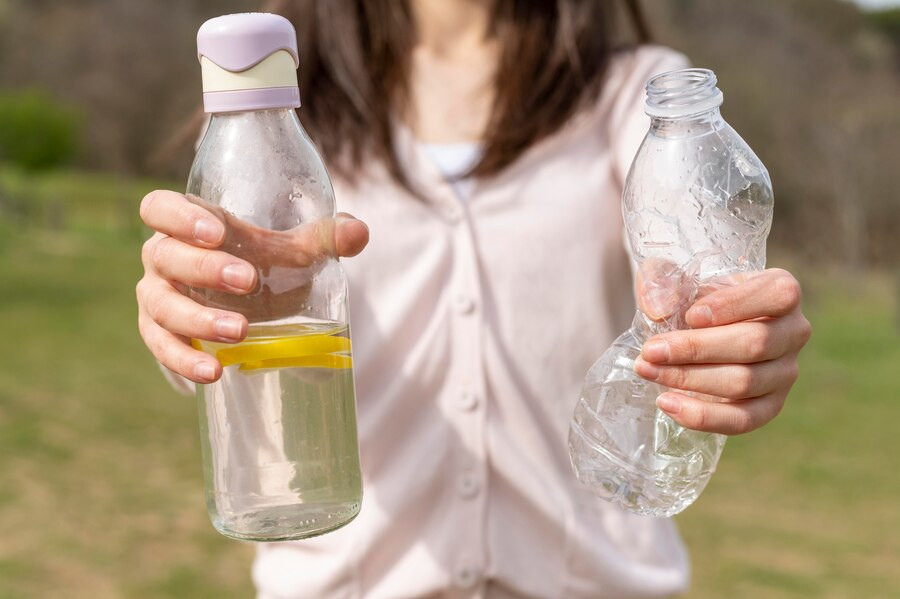The label "BPA free" is commonly printed on certain plastic products, such as drinking water bottles, jugs, or plastic lunch boxes. This label indicates that the packaging is free from BPA, a commonly used component in plastic manufacturing.
What is the actual definition of "BPA-free" and why is it important to use products that are labeled as such?
What are BPA and BPA-Free?
BPA, or bisphenol A, is a chemical compound that is used in the production of epoxy resin and polycarbonate. There are numerous applications for polycarbonate, including the production of cutlery, appliances, electronic equipment, and drink vessels. In the interim, epoxy resin serves as a protective coating for canned food and other items.
The possible impacts of BPA on human health have made it a matter of concern. Many are worried that the use of plastic items, particularly when they come into contact with hot or acidic liquids, will introduce bisphenol A (BPA) into the food and drink we consume.
Read more: Dangers Of BPA Content In Drinking Water Bottles
Excessive exposure to BPA has been associated with hormone issues, abnormal reproductive development, and several medical conditions.
A product labeled "BPA free" indicates that it does not contain BPA. This phrase is commonly employed to refer to plastic bottles and cans. This word is crucial, as it might offer customers an increased sense of security by minimizing their exposure to BPA in their daily lives.
Why is it necessary to use products labeled BPA-free?
There are several factors that contribute to the decision of several people to choose products that are branded as "BPA-free". These causes include:
Hormonal disorders
One of the primary reasons why it is important to avoid BPA is because of the potential adverse impact it may have on the health of the hormones. BPA has the potential to behave similarly to hormones and cause disruptions in the endocrine system. This can lead to a variety of health issues, including reproductive difficulties, developmental disorders in children, and other hormone-related health issues.
Exposure through food and drinks
Exposure to heat can cause BPA to infiltrate into food and beverages from plastic containers. BPA is not visible; however, it may enter the body through plastic packaging that is heated.
Read more: Tips For Choosing Plastic Drinking Bottles That Are Safe For Health
Health risks
Despite the fact that research into the precise health hazards associated with BPA exposure is still ongoing, there are some animal studies that point to the possibility of adverse effects on health. Several impacts, including the chance of developing cancer, metabolic problems, and disorders of the brain system, have been the subject of research.
In order to prevent BPA exposure, it may be necessary to explore alternative product options, including stainless steel, ceramic, or glass, in addition to choosing packaging that is BPA-free. It is recommended to avoid from heating food in plastic containers, particularly when it is uncertain whether they contain BPA.
If you have any additional inquiries concerning BPA, you can either visit a doctor or make use of the consultation features that are available in the Ai Care application by downloading the Ai Care application from the App Store or Play Store.
Looking for more tips and tricks for health, first aid, and home remedies? Click here!
- dr. Alvidiani Agustina Damanik
Food Standars Agency (2024). BPA in plastic. Available from: https://www.food.gov.uk/safety-hygiene/bpa-in-plastic
Mayo Clinic (2023). Brent A. Bauer, M.D.. Available from: https://www.mayoclinic.org/healthy-lifestyle/nutrition-and-healthy-eating/expert-answers/bpa/faq-20058331
SaVanna Shoemaker, MS, RDN, LD and Alina Petre, MS, RD (NL) (2024). What Is BPA? Should I Be Concerned About It?. Available from: https://www.healthline.com/nutrition/what-is-bpa
WebMD (2024). The Facts About Bisphenol A. Available from: https://www.webmd.com/children/bpa
National Institute of Environmental Health Sciences (2023). Bisphenol A (BPA). Available from: https://www.niehs.nih.gov/health/topics/agents/sya-bpa
Silent Spring Institute. 6 Simple Steps to Avoid BPA and Phthalates in Food. Available from: https://www.mbcc.org/6%20steps%20to%20avoid%20BPA.pdf











